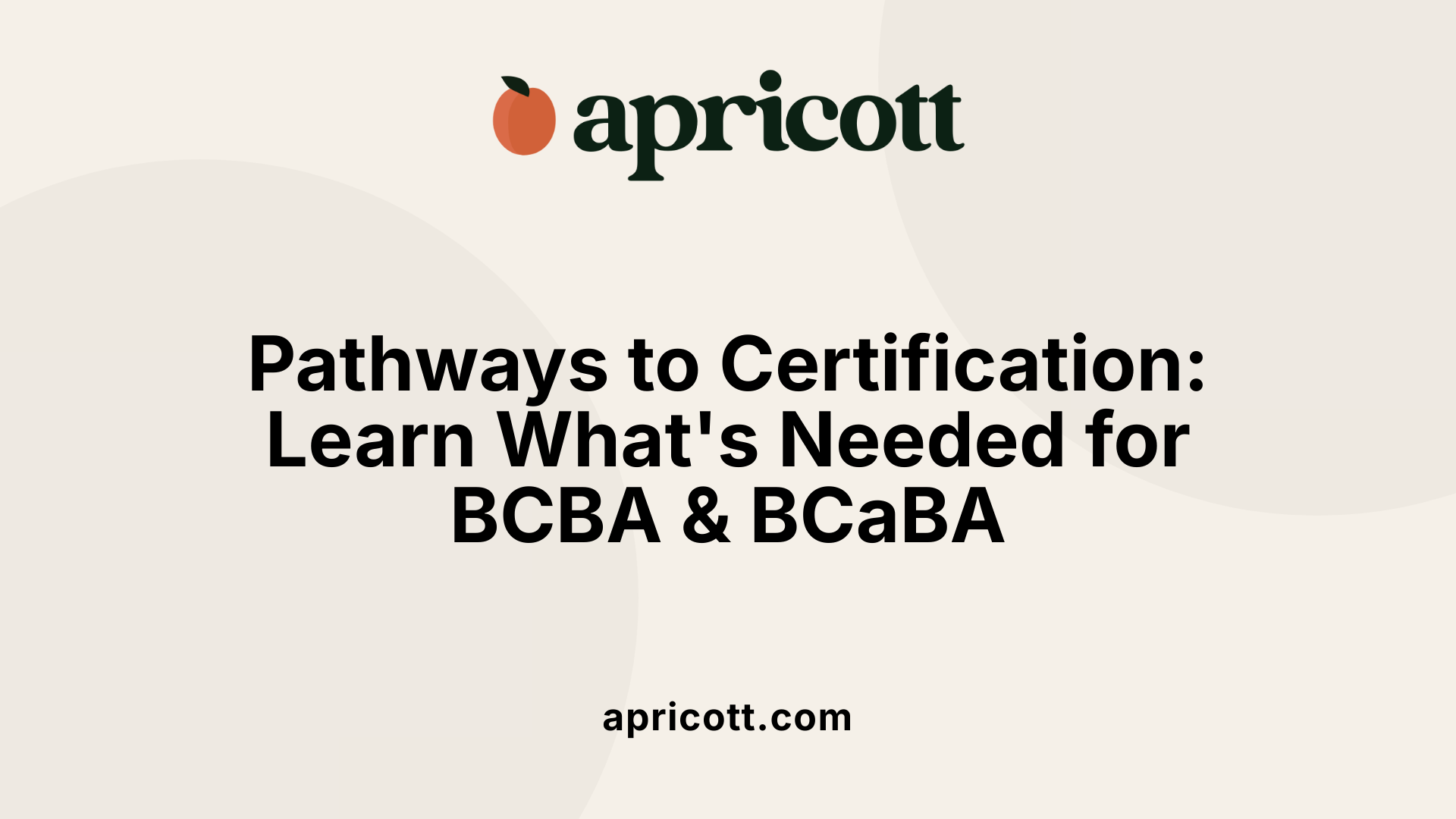July 28, 2025
Understanding the Distinctions in Behavior Analysis Certifications
In the rapidly growing field of applied behavior analysis (ABA), certifications such as BCBA and BCaBA are essential credentials that define professionals' qualifications, roles, and responsibilities. This article explores these distinctions thoroughly, guiding aspiring and current practitioners in making informed career decisions.

To become a BCBA (Board Certified Behavior Analyst), candidates need a master's degree in behavior analysis or a related field from an accredited program. They must complete at least 315 hours of approved coursework, which includes essential classes like Behavior Assessment & Intervention and Professional Issues in Developmental Disabilities. Additionally, applicants must log around 2,000 hours of supervised fieldwork involving direct work with clients. Once these requirements are met, candidates must pass the BACB certification exam, a comprehensive test of their knowledge and skills.
For the BCaBA (Board Certified Assistant Behavior Analyst), the pathway begins with holding a bachelor's degree with the relevant coursework. Candidates are required to complete approximately 1,300 hours of supervised practical experience. They must also pass the BCaBA exam, which verifies their understanding of behavior analysis principles. Both certification levels demand strict adherence to educational, supervision, and examination standards, although BCBA requirements are more advanced, reflecting their higher level of practice.
These standards ensure that both BCBA and BCaBA professionals are well-prepared to deliver effective behavior-analytic services, with the BCBA having greater independence and responsibility.
Achieving BCBA certification requires candidates to hold a master's degree in behavior analysis or a similar field from an accredited university. They must complete the BACB’s mandated coursework, totaling around 315 hours, covering topics such as ABA assessment, intervention, ethics, and research methods. Following coursework, candidates must accumulate 2,000 hours of supervised fieldwork, including direct client interactions and assessments, to demonstrate practical skills.
The BCaBA certification pathway is accessible to those with a bachelor’s degree in behavior analysis or related disciplines. Candidates need to complete about 130 hours of coursework that align with BACB standards, which can often be facilitated through online programs like those offered by UCSB. They must also accrue 1,300 hours of supervised practical experience, focusing on behavioral assessments and interventions.
Both pathways emphasize coursework, hands-on supervised practice, and passing a certification exam. Notably, the coursework for both certifications can be fulfilled through specialized online programs, which are designed to meet the BACB’s standards and prepare candidates effectively.
These structured pathways support individuals seeking careers in behavior analysis, offering clear requirements and accessible options aligned with professional standards.

A BCBA (Board Certified Behavior Analyst) is a master’s-level professional authorized to work independently in applied behavior analysis (ABA). They evaluate behaviors, develop intervention plans, conduct assessments, and supervise other professionals like BCaBAs and RBTs.
In contrast, a BCaBA (Board Certified Assistant Behavior Analyst) holds a bachelor’s degree and supports behavior-analytic services under the supervision of a BCBA. They assist with assessments, data analysis, and program implementation but cannot operate independently.
The pathway to certification varies: BCBAs need a graduate degree, specialized coursework, and supervised fieldwork, while BCaBAs require a bachelor’s degree, coursework, and supervised practice at a lower level.
BCBAs have higher responsibilities, including designing treatment programs and supervising others, whereas BCaBAs focus on implementation and support tasks.
This distinction is crucial in understanding career progression, with growing demand reflecting their vital role in autism therapy across multiple settings.
The BCaBA and RBT certifications serve different levels of the behavior-analytic workforce. A BCaBA requires a bachelor’s degree, completed coursework, and supervised practical experience. They support BCBAs by conducting assessments, supervising RBTs, and helping develop programs.
RBTs (Registered Behavior Technicians), on the other hand, are entry-level practitioners who typically have a high school diploma or equivalent. They complete 40 hours of training, pass a competency assessment, and work directly with clients under supervision.
BCaBAs have more education and responsibilities than RBTs, including supervising RBTs, assisting with assessments, and contributing to treatment planning. RBTs focus mainly on direct client interactions, implementing behavior plans designed by BCBAs or BCaBAs.
While RBTs are essential for on-the-ground service delivery, BCaBAs and BCBAs carry broader responsibilities, such as program evaluation and supervision.
Salaries for BCBAs tend to range between $55,000 and $85,000 annually, influenced by factors like experience, geographic location, and employer. They enjoy significant autonomy, including conducting assessments, creating behavior plans, and supervising other team members.
BCaBAs generally earn between $35,000 and $55,000 per year. Their role involves supporting BCBAs through data collection, intervention implementation, and supervision of RBTs.
The demand for behavior analysts is rapidly increasing, with a projected growth rate of about 8% over the decade from 2020 to 2030. This rise is driven largely by increased awareness and need for autism interventions.
Many professionals start as BCaBAs to gain experience before advancing to BCBA, providing opportunities for career growth, higher salary, and increased responsibility.
Understanding these roles and prospects helps aspiring professionals navigate their career pathways effectively.
| Certification | Typical Salary Range | Responsibilities | Education Requirements |
|---|---|---|---|
| BCBA | $55,000 - $85,000 | Independent practice, assessments, supervision | Master’s degree in ABA or related field |
| BCaBA | $35,000 - $55,000 | Supportive role under supervision, assessments, supervision of RBTs | Bachelor’s degree, coursework, supervised experience |
| RBT | Around $44,000 | Direct client intervention, implementation of behavior plans | High school diploma, 40 hours training |
This information underscores the distinct roles, responsibilities, and future opportunities within the field of behavior analysis.

A BCBA (Board Certified Behavior Analyst) is a master's-level professional authorized to practice independently in applied behavior analysis, including assessment, intervention, and supervision of others. In contrast, a BCaBA (Board Certified Assistant Behavior Analyst) holds a bachelor's degree and provides behavior-analytic services under the supervision of a BCBA; they cannot work independently.
To become a BCBA, individuals must complete a master's degree with specified coursework, accumulate 1,500 to 2,000 supervised fieldwork hours, and pass the BCBA certification exam. BCaBAs, on the other hand, require a bachelor's degree, related coursework, and at least 1,000 hours of supervised practical experience, followed by passing their respective exam.
BCBAs can supervise BCaBAs and RBTs (Registered Behavior Technicians), guiding the implementation of behavior plans and ensuring ethical practice. BCaBAs support behavior intervention plans but work under the supervision of BCBAs. The increased autonomy of BCBAs reflects their advanced training and scope of practice, making them integral to delivering comprehensive behavior analysis services.
The rising demand for these professionals highlights their vital role in supporting individuals with autism and developmental disabilities across various settings, from schools to clinics.
Understanding the differences between BCBA and BCaBA certifications is essential for anyone pursuing a career in applied behavior analysis. Both certifications serve vital roles within this expanding field—BCBAs providing independent clinical services and supervision, and BCaBAs supporting intervention delivery under supervision. As demand continues to rise for behavior analysts, opportunities for career growth, specialization, and impact grow accordingly. Aspiring professionals should weigh their educational background, career aspirations, and desired level of independence to choose the right certification pathway, and stay committed to ongoing education and ethical practice to advance and excel in this meaningful career.